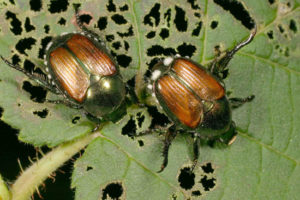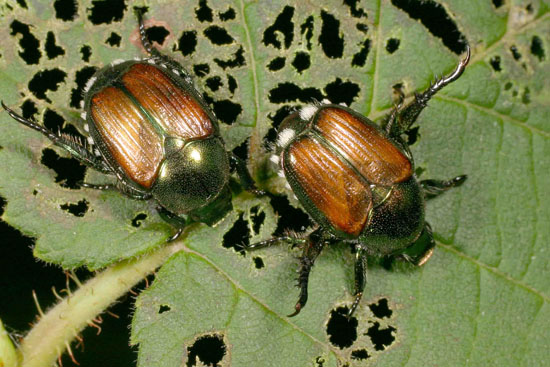Ways to Combat Japanese Beetles
Insects are always the scourge of any garden or plants. Aphids, earwigs, and beetles are those most commonly found in Minnesota. At this point in the season, Japanese beetles are hatching and causing destruction in gardens across the state. For example, Japanese beetles have taken to attacking rose bushes and other flowering plants in the Twin Cities. Gardeners.com provided a list of the most vulnerable plants to Japanese beetles:

- Linden
- Crabapple
- Apple
- Japanese maple
- Norway maple
- Rose
- Crape myrtle
- Pin oak
- Birch
- Cherry (plum, apricot, peach)
There are many ways to prevent the outbreak of Japanese beetles, but there are also ways to get rid of them after they have made themselves known. The most common way to remove them is by hand picking. The Farmer’s Almanac provided several tips and tricks that will prevent, remove, and destroy the invasive species:
- Try to select plants that Japanese Beetles will not be attracted to. See our list of Best and Worst Plants for Japanese Beetles.
- Good horticultural practices, including watering and fertilizing, will reduce the damage caused by these beetles.
- In the grub stage of late spring and fall (beetles have two life cycles per season), spray the lawn with 2 tablespoons of liquid dishwashing soap diluted in 1 gallon of water per 1,000 square feet. The grubs will surface and the birds will love you. Spray once each week until no more grubs surface.
- Unfortunately, the most effective way of getting rid of Japanese beetles is to hand pick them. It’s time consuming, but it works, especially if you are diligent.
- You can also purchase parasitic nematodes (most garden centers have them) and drench the soil around the area where you have the problem.
- Neem oil and sprays containing potassium bicarbonate are somewhat effective.
- Put down a drop cloth and, in the early morning when they’re most active, shake them off and dump them into a bucket of soapy water. They will not survive.
- If you wish to spray or dust with insecticides, speak to your local cooperative or garden center about approved insecticides in your area.
- Beetles on Roses? Note that insecticides will not fully protect roses, which unfold too fast and are especially attractive to beetles. When beetles are most abundant on roses, nip the buds and spray the bushes to protect the leaves. When the beetles become scarce, let the bushes bloom again. Timeliness and thoroughness of application are very important. Begin treatment as soon as beetles appear, before damage is done.
NOTE: To protect our environment, Parkway Lawn only uses bee-safe grub control. Many dusts or sprays are highly toxic to honeybees. If application of these materials to plants is necessary during the bloom period, do not apply during hours when bees are visiting the flowers. If larger than yard and garden plantings are to be treated, you may need to contact nearby beekeepers in advance so that they can protect their colonies.
The University of Minnesota has extensive knowledge on Japanese beetles. To garner information regarding the breeding, identification, and insecticide information, go to http://www.extension.umn.edu/garden/insects/find/japanese-beetles/.
The experts at Parkway Lawn Services are ready to help you with all your lawn care needs, questions, and concerns. We have over 30 years of experience of serving customers in the Twin Cities. Call us today at 612-869-5878 for any outdoor pest or lawn care needs.

